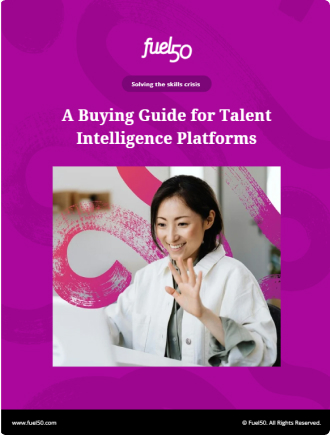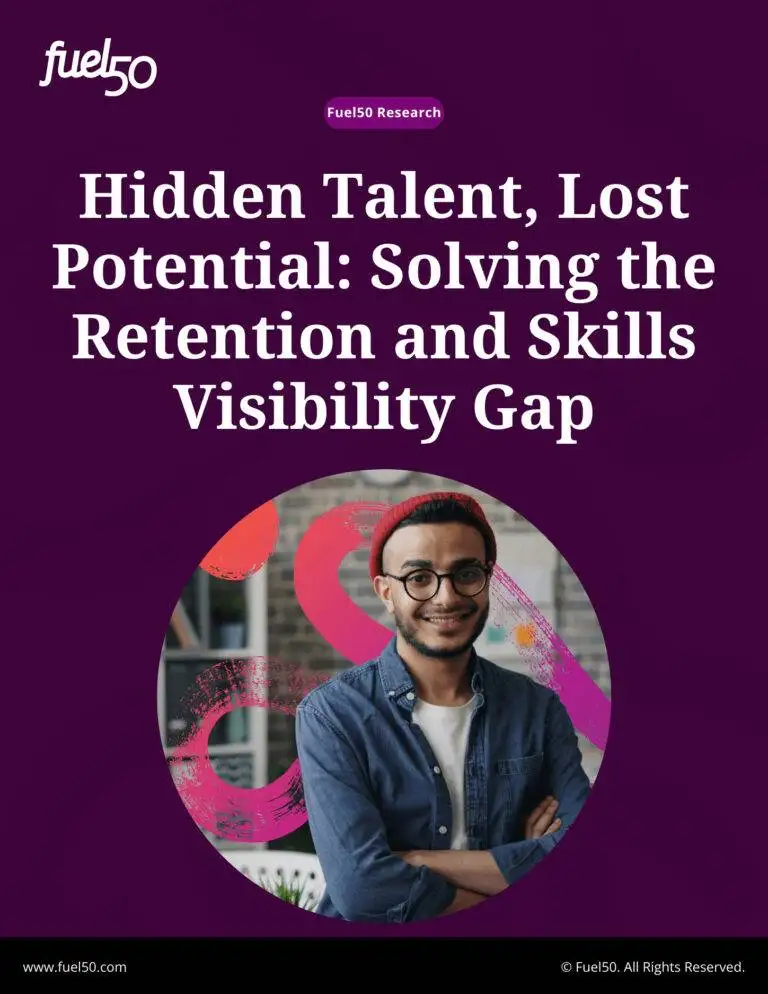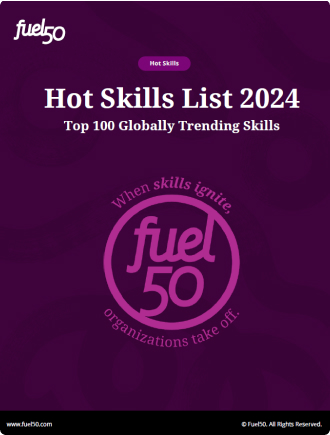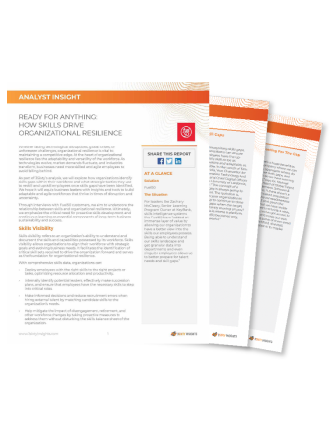If you listen to Dr. Kelly Monahan, she will tell you that for some, the workplace “exodus” — aka, The Great Resignation — is coming, but there are ways your organization can fulfill “the fundamental needs of people” and help avoid it.
In fact, Dr. Monahan, the Global Lead Talent Researcher for Accenture, made a case for how to better build your workforce in a presentation she made at Fuel50’s FuelX Talent Mobility Conference titled Unlocking the Future Workforce’s Potential: Leaving People Net Better Off.
Here’s how she put it:
“One thing that I think is really important that we were beginning to see emerge before the pandemic, but really this was accelerated … is that new skills or jobs are needed. One of the surprising findings we’ve seen in our research is … the digital skills gap. …
But some of that discontentment we are anticipating once the economy rebounds, once people feel safe to make different choices about their work, we are concerned that there will be an exodus in certain places for companies that don’t get what we believe this net better off model (does) — if we don’t meet these fundamental needs of people. …
This newfound need has been bubbling up and emerging, and we believe the pandemic has really accelerated this newfound need for workers to find new skills, and we believe there’s going to be a lot of talent mobility in the upcoming years.“
Trust is at the heart of the Net Better Off model
OK, so what is Accenture’s “Net Better Off” model?
It is based on meeting six (6) fundamental human needs through work, and by doing that, companies can unlock their people’s full potential. What Net Better Off measures, and brings into focus, is what truly inspires workers’ potential.
Accenture’s research found that each of the six dimensions of “Net Better Off” is significantly correlated with people trusting their employer:
- Employable – Having marketable, in-demand capabilities and skills to obtain goods job and advance a career;
- Financial — Being financially secure without undue economic stress or worry;
- Purposeful — Feeling that one makes a positive difference and that life has meaning and a greater purpose;
- Relational — Feeling a strong sense of belonging and inclusion; having strong personal relationships;
- Emotional & Mental — Feeling positive emotions and maintaining mental wellness;
- Physical — Being in good physical health with a lack of stress.
Dr. Monahan described the Net Better Off model like this:
“(Here’s) a question I always like to ask … How are you feeling today as you think about these Net Better Off dimensions? Does this resonate with you and where you’re at in your personal and professional lives? If there’s one dimension that you feel may be lacking, what is that? Because (it) is so important that we have an awareness — a self-awareness — of how we’re presenting ourselves at work, and that our leaders have an understanding of us as human beings … And the beautiful thing about all of this is when this is firing on all cylinders, individuals prosper and businesses profit. And that, to me, is the beauty behind this work.”
Questions you need to be asking
The Net Better Off model raises a lot of questions that managers and leaders should be asking as they work to grow their talent by digging into the six dimensions that are the building blocks of Net Better Off. In fact, Dr. Monahan made the point that Net Better Off can really help businesses and organizations support their employees during the turbulent times that we have all been facing and struggling with over the past 18 months.
And as she adds, it all begins with knowing the right questions to ask at the start. For example:
- Are we equipping people with the right adjacent skill sets to transition into higher-paying jobs and explore new jobs and industries?
- Do our reward and benefits packages meet the evolving needs of our people in times of crisis and in times of abundance?
- How do we create a sense of belonging in virtual teams? How do we ensure that every voice is being heard throughout the organization?
- What have we learned about our peoples’ physical well-being that should be adopted as best practices moving into the future?
- How does our purpose evolve to meet an enlightened workforce and customer? How does our purpose come to life in our communities?
- How can we support the ongoing mental resilience of our people when the potential trauma from the crisis may have lasting effects?
She adds this:
“Here is a question we need to be having: Are we equipping people with the right skill sets? You know, are we actually giving them opportunities to get into higher-paying jobs? How do we use talent mobility and all the visibility we now have, through programs like Fuel50 … to actually allow us to see what the skills people have? What is the skills pathway they needed to actually succeed in transition into better-paying jobs?”
In fact, Accenture’s work on the Net Better Off model came to a truism that most people know intuitively — that “long term, better off people are better for business.”
The bottom line? It’s increasing business performance
That’s not a huge surprise, but it shows you that even in today’s chaotic world, some basic business truths still apply. And, they added this: “As employers boost these (Net Better Off identified) dimensions and create meaningful and trusting relationships with employees, they see an increase in business performance.”
How much of an increase? According to Accenture, ” Even in today’s weak GDP environments, organizations stand to gain upwards of 5 percent revenue growth by employing practices that leave people Net Better Off.”
That’s not all. The research also found that “during a strong and growing economy, organizations can realize double-digit revenue growth.”
As Dr. Monahan explained it:
“We ran the modeling to assume the worst-case scenario. But yet, we found for companies that were leaving their people Net Better Off, even during times of negative GDP growth, these organizations were growing at a 5% increase last year. I think that’s profound as we think about the economic climate we were in. And not just that, in the economic climate prior to the pandemic we were seeing upwards of 22% revenue growth for these companies that were leaving their people Net Better Off.”
Here’s the bottom line, as Accenture sees it: Businesses are ready for change, and so are their people. And they add, “Across the business, there is a greater alignment that leaving people net better off across all six dimensions is the responsibility of the business.”
Before the pandemic, they found that 67 percent of workers strongly believe that their employer is responsible for helping them become net better off.; although only 35 percent of CXO’s agreed with that. However, during the lockdown, the number of employees who strongly believe that their employer is responsible for helping them become net better off jumped to 78 percent, while the number of CXO’s who agreed with that shot up to 50 percent.
Accenture also tested 20 common sense talent practices, common sense talent practices that HR does because they believe they will help them to “engage employees and do well by them.”
“Sweet Spot Practices” that HR needs to follow
But as Dr. Monahan explained, only five of these are what they call “sweet spot practices,” “the five things that I know from looking at all the data, are helping people get better off and help your business.” They are:
- Enabling continuous learning to ensure a future-ready workforce that can shift at scale. A whopping 98 percent of workers would recommend their employer to others if they did this, yet Accenture found that only 20 percent of organizations say they lead in this practice.
- Listening to what your people need at the front lines, empowering them with real-time data. Some 97 percent of employees effectively act to change when this happens, yet only 15 percent of organizations claim to lead in this practice.
- Using technology to enable flexible work arrangements and more creative work for your workforce that is increasingly dispersed. Some 98 percent of people are likely to feel fulfilled in their work when this happens, however, only 20 percent of organizations claim to lead in this practice.
- Champion workforce well-being and equality because safety and emotional needs are more important than ever. When this happens, 94 percent of employees put significantly more effort into their work, yet only 17 percent of businesses say they lead in this practice
- Set and share people metrics. Take accountability for diversity and equality and be transparent in how you engage with them as an organization. Nearly three-quarters (72 percent) of people say they have a positive experience at work, but only 15 percent of companies claim to lead in this practice.
Searching for the “Modern HR Leader”
This all leads to one final and important question — what then is a modern HR leader?
Dr. Monahan spends a lot of time breaking this down — and you really need to listen to the presentation to get the sharp insights about this that she has to offer — but in the end, it breaks down like this:
A modern HR leader is one who is unlocking at least one of these “sweet spot practices” in their organization, yet the Accenture research found that only 1 in 5 HR leaders were actually meeting that goal.
And Dr. Monahan underlined that data by adding this:
“What I think our research is sharing and what these modern CHROs and HR organizations are doing, is they’re moving beyond the transactional view of work, and even employment, in moving into much more of a transcendent or transactional relationship and are transcending that in order to actually capture the hearts and minds of their workforce.”
















